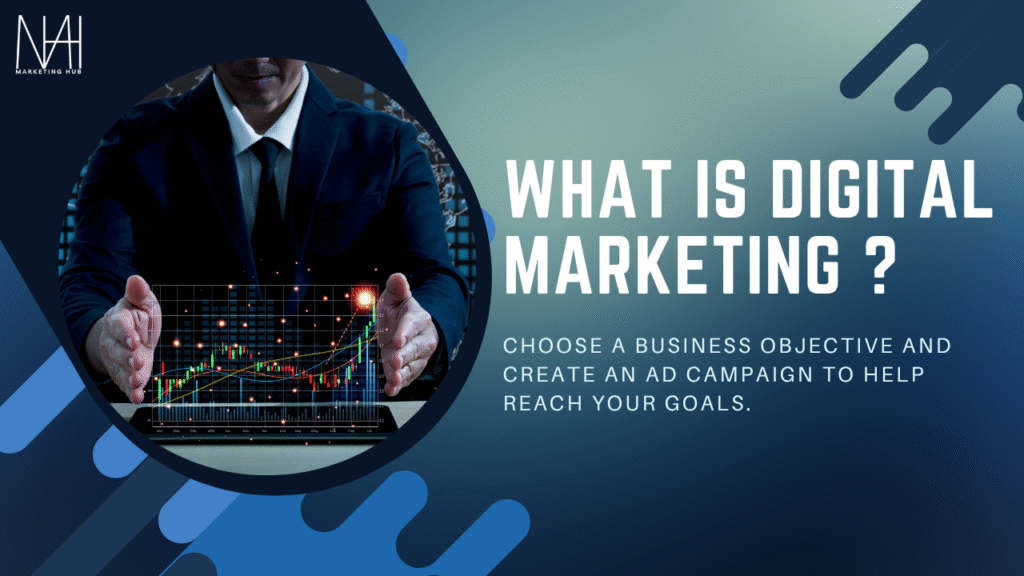Digital marketing is no longer optional — it’s essential. As a start-up or an international business, digital marketing provides the means to engage with customers, establish brand identity, and fuel growth in a crowded marketplace. Digital marketing refers to the use of digital platforms such as search engines, social media, email, websites, and mobile apps to promote services or products.
The aim is to bring brands and potential customers together in a targeted, measurable, and cost-efficient manner. Whether it’s pay-per-click (PPC) advertising or content marketing, SEO or influencer collaborations, digital marketing comes in many different formats. It enables businesses to reach their audience wherever they might be—online.
Difference Between Traditional Marketing and Digital Marketing
Traditional and digital marketing both serve the purpose of promoting products and services, but the ways, extension, and impact are quite different. Below is a comprehensive comparison to let you know what the major differences are:
| Feature | Traditional Marketing | Digital Marketing |
| Channels | Uses offline mediums like television, radio, newspapers, magazines, and billboards. | Relies on online platforms such as websites, social media, search engines, and email. |
| Cost | Often involves a high investment, especially for print ads or TV commercials. | Generally more affordable, with options to run ads even on a small budget. |
| Measurability | Difficult to track exact performance or ROI of a campaign. | Provides detailed analytics, allowing real-time tracking of impressions, clicks, and conversions. |
| Targeting | Targets a broad and general audience with limited personalization. | Allows precise targeting based on demographics, interests, behavior, and location. |
| Engagement | Offers one-way communication—brands talk, consumers listen. | Promotes two-way interaction through likes, comments, shares, and messages. |
| Flexibility | Once launched, campaigns cannot be changed easily or quickly. | Offers flexibility to modify or optimize campaigns in real-time based on performance. |
In short, digital marketing provides more control, flexibility, and access for contemporary businesses seeking to connect with a technologically savvy audience, while traditional marketing remains useful for brand recognition and connecting with people in non-digital environments.
Significance of Digital Marketing
Most individuals today spend a significant amount of time online. If your business is not online, your competitors will dominate. Here’s why digital marketing is so significant:
1. Global Reach:- You can present your products or services to individuals worldwide. It makes your business expand outside your city or nation.
2. Precision Targeting:- You can target the right individuals according to their age, interests, location, and so on. This implies that your message reaches the people who are most likely to purchase.
3. Better ROI:- You can observe what is giving results and what is not. This assists you in spending less and earning more from your advertising.
4. Real-Time Engagement:- You can communicate with your customers in real-time via messages, comments, or live videos. This assists in creating trust and strong bonds.
5. Data-Driven Decisions:- You receive helpful data regarding your customers and the performance of your ads. You can utilize this to make wiser decisions and enhance your outcomes.
Advantages of Online Marketing
Online marketing provides numerous benefits over the traditional methods:
1. Greater Reach at Reduced Costs:- Ads, blogs, and social media updates can reach millions for a fraction of the cost of a billboard or TV ad.
2. Data & Insights:- Google Analytics and other tools enable you to see user behaviour and campaign performance in real-time.
3. Personalization:- Segment your audience and send them personalized messages based on their interests, location, and behaviour.
4. Increased Engagement:- Shares, likes, comments, and DMs create an open dialogue between brands and consumers.
5. Fast Conversions:- Cross-channel marketing enables users to flow from advertisement to checkout in mere taps.
6. Goal Alignment:- Your online marketing strategy can map directly to overall business goals such as sales, lead generation, and retention.
Is Digital Marketing the Same as Online Marketing?
No. Online marketing is a subcategory of digital marketing.
- Digital Marketing: All digital media—TV, radio, digital signs, and online platforms.
- Online Marketing: Just internet-based mediums such as SEO, PPC, email, and social media.
So all online marketing is indeed digital, yet not all digital marketing is online.
Basics of Digital Marketing
Knowing the fundamentals of digital marketing enables you to plan clever campaigns that pay off. Below are the chief building blocks:
1. SEO (Search Engine Optimization):- SEO is the method of optimizing your site so that it ranks higher in search engine listings such as Google. It involves employing the proper keywords, speedy pages, mobile-friendliness, and writing useful content. A good SEO plan brings free (organic) traffic to your site.
2. Content Marketing:- This is all about publishing helpful and engaging content — such as blogs, videos, guides, or social media. Your aim is to respond to your audience’s questions, to solve their issues, and trust is built through the long-term. Good content makes people revisit your brand.
3. Email Marketing:- Email marketing is also one of the best methods of keeping in touch with your customers. You can send them updates, special offers, product information, or newsletters straight to their inbox. It’s personal, inexpensive, and works very well when done properly.
4. Social Media Marketing:- This involves cross-promoting your brand on channels such as Facebook, Instagram, LinkedIn, Twitter, or YouTube. It’s an excellent means of growing your community, engaging with your audience, and sharing content that aligns with your brand’s voice and values.
5. Paid Ads (PPC – Pay-Per-Click):- With PPC, you only pay when a person clicks on your ad. You can advertise on search engines such as Google or on platforms such as Facebook and Instagram. It’s fantastic for reaching an audience quickly and generating fast traffic or sales.
6. Affiliate & Influencer Marketing:- With affiliate marketing, somebody else (your affiliates) peddles your products and collects a small payment for each purchase. Influencer marketing is almost the same except that you hire a popular social media influencer to discuss your brand with his/her audience. Both allow you to reach many more people easily and with their trust.
7. Mobile Marketing:- Individuals spend a lot of time on their phones, so mobile marketing is all about catching them where they are — through SMS messages, app notifications, or ads within apps. It’s immediate, quick, and extremely effective when going after users on the move.
Types of Digital Marketing
Following are 12 key types of digital marketing and what they are:
1. Content Marketing:- Publishing useful blogs, videos, or posts that teach or amuse individuals. It establishes trust and gets people onto your site.
2. Search Engine Optimization (SEO):- Getting your site rank higher on Google so that more individuals find it. It brings free search engine traffic.
3. Email Marketing:- Sending emails to individuals to promote offers, news, or useful tips. It keeps your audience interested and facilitates repeat sales.
4. Pay-Per-Click (PPC):- Paid advertisements where you only pay when someone clicks on your advertisement. Google Ads and social media advertisements are typical examples.
5. Affiliate Marketing:- Other individuals promote your product and get paid for each sale they facilitate. It’s a means of expanding your business through partners.
6. Social Media Marketing:- Marketing your brand on social media sites such as Instagram, Facebook, or Twitter. It assists in reaching out to customers and expanding your brand.
7. Influencer Marketing:- Collaborating with social media influencers to market your product. Their fans trust their recommendations, so it increases your brand’s visibility.
8. Native Advertising:- Ads that appear like regular content (such as a blog or social media update) but are actually paid. They don’t resemble ads, so individuals pay more attention.
9. Marketing Automation:- Employing tools to send messages and emails automatically. It saves time and assists in handling your marketing better.
10. Mobile Marketing:- Marketing on mobile phones and tablets via apps, SMS, or mobile ads. It assists in reaching people who are constantly on their phones.
11. Video Marketing:- Employing videos to market your brand — such as tutorials, advertisements, or customer testimonials. Videos capture attention and convey quickly.
12. Online PR and Reputation Management:- Online PR (Public Relations) is taking care of your brand’s reputation online. It encompasses being featured on online news, blogs, and replying to reviews. Reputation management builds trust by dealing with negative comments or feedback and presenting your brand positively.
Scope of Digital Marketing in 2025 and Beyond
The arena of digital marketing is getting larger as technology develops. The dominant trends in its future shape up as:
- AI & Automation: Automating campaign optimization, personalization, and data analysis.
- Voice Search: Satisfying SEO for voice assistants like Siri and Alexa.
- Interactive Content: Polls, quizzes, and live video to drive more engagement.
- Hyper-Personalization: Customizing messages for one person through big data.
- Sustainability: Consumers embrace brands that show social and environmental responsibility.
With companies moving toward digital-first business models, career prospects in digital marketing—such as SEO experts, content specialists, and performance marketers—are expanding exponentially.
Digital Marketing Challenges
Though mighty, digital marketing isn’t without challenges:
- Algorithm Changes: Google or Instagram algorithm changes can upset visibility.
- Data Privacy: GDPR, CCPA, etc. compliance.
- High Competition: Differentiating in saturated markets.
- ROI Measurement: Attribution continues to be an issue.
- Trust Building: Customers are wary—authenticity is key.
Knowing these makes you navigate smarter.
Final Thoughts
Digital marketing is the pulse of today’s business. It’s agile, data-informed, and scalable—ideal for small businesses and large enterprises alike. With the right strategy, tools, and mindset, digital marketing can help you establish meaningful connections and drive measurable growth. Whether you’re just starting out or looking to refine your existing campaigns, understanding the fundamentals of digital marketing is the first step toward sustainable success.
FAQs about Digital Marketing
1. What is digital marketing in simple words?
Digital marketing means promoting your products or services using the internet and digital platforms like websites, social media, emails, and search engines.
2. What is SEO and why is it important?
SEO makes your site appear on Google when users search for something about your business. It drives more traffic without costing you a penny for advertising.
3. Can social media posting actually benefit a business?
Yes! Instagram, Facebook, and LinkedIn make it easy to reach your audience, post updates, and build a loyal fan base.
4. What’s the function of content in web promotion?
Good content such as blogs, videos, or reels answers questions, resolves issues, and wins trust with your audience. And it aids the search rankings tool.
5. Does email remain valuable for connecting people?
Absolutely! Emails are best for sending notices, promotions, and reminders. They come across as personal and are effective for keeping your audience engaged.
6. Are pay-per-clicks worth the spend?
They can work very well when they are done properly. You only pay when someone clicks, and you are able to target people by location, age, or interests.
7. Why do small businesses gain from online tools?
They can reach more individuals without paying too much. WhatsApp, Google Maps, and Instagram are some of the tools that enable easy connection with customers.
8. What is the role of influencers and affiliates?
They endorse your products to their fans. Because they are liked, their endorsement can enhance your brand and sales.
9. Can I monitor whether my efforts pay off?
Yes, sites like Google and Facebook provide reports—how many viewed your posts, clicked links, or purchased something. This allows for better results.
10. Is this an excellent career to begin with today?
Yes! SEO, content writing, and social media skills are highly sought after. You can work for companies, or even as a freelancer.

